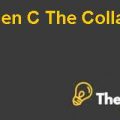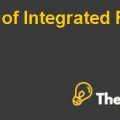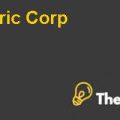Question1. ) Calculate the IRR of the Mozal project. What is the real expected return using the CAPM so, Why would Gencorp/Alusaf invest in the Mozal project?
Answer:
The internal rate of return of the Mozal project has been calculated using the projected cash flows presented in the exhibit 6 of case study, however, the projected cash flows also show an outflow of funds for the dividend payments and interest payments on subordinate debt, which should not be deducted because they are part of the owner’s withdrawal. Meanwhile, due to the nature of subordinate debts they are also like an equity,therefore, a revised cash flow has been calculated in appendix 1. However, the IRR calculated using the projected cash flows return a yield of 13.43%, meanwhile, the real expected return has been calculated using the capital asset pricing model CAPM which required inflation index rate.
Further, the inflation index rate has been calculated using the fishers’ index, formula, hence, the resultant real cost of equity has been calculated as 12.91%. Meanwhile, the IRR measures the return that a particular project is expected to yield over the life of the project and the real rate of return on equity measures the company’s specific required rate of return by the equity investors. Therefore, based on the IRR of 13.43% and real expected return of 12.91% shows that the project will generate cash flows in excess of the returns required by the equity investors, hence, Gencorp/Alusaf should invest in the Mozal project to earn a return of 13.43% on their investment.
Question2. ) What are the greatest risks? Have they been adequately addressed?
Answer:
The Mozal project involves the establishment of a venture between three entities Eskom, Alusaf and Mozambican government and since the project will require automated technology and will involve the Mozambican government, which is an underdevelopedcountry, therefore, the project will be exposed not only to the technological risks but will also be exposed to the excessive delays in timely completion of the Mozal project. Furthermore, the operational risks would be thereregarding the acquisition of resources, additionally, since the Mozal project is a foreign investment project and would involve foreign currency, therefore, investment in Mozal project will also involve currency risk.
Technology
Since the project involvesusage of high technology and the success of Mozal project would largely depend on the success of technology used, therefore, the one of the greatest risks of Mozal project would be the useof inappropriate technology. Further, the project is exposed to risk of handling the construction of a project that requires technology and skills. However, the Alusaf has been involved in the aluminum business and recognizing the best technology is mere a light judgment for him. Meanwhile, Alusaf had already used the smelter technology in Hillside smelter that later turned out to be a meaningful decision. Additionally, the Gencor has the skills and abilities of constructing the project because he has been the drive force for handling Hillside smelter project. Hence, the technological risk has been addressed appropriately because the proven smelter technology would be used in the Mozal project.
Timely Completion of the Project
Since the government of Mozambique is directly involved in this project, therefore, it would involve bureaucratic procedures to comply all the legal and legislative requirements of the state and the Mozal project is subject to approval by the government of Mozambique thereon.Hence, the project would be exposed to extensive delays in the meantime. In contrast, Mozambique exists as a weak economy and lacks sufficient infrastructure to provide a favorable sight to the project therefore, the project would probably stuck with delays in its completion
However, in order to avoidunconditional delays the company is seeking prior permission of the state to grant construction permit. Thus an agreement hasbeen signed with the South African government to address risks associated with delays. The charter of agreement demonstrates to establish a special liaison committee that would assist to address the legal matters regarding the legal hindrance (construction permit).
Meanwhile, the Mozal project demands same staff as previously allocated for the hillside smelter project to ensure the accuracy and timely completion
Financing the Mozal Project Case Solution
Operational Risks
Further, the Mozal project would be exposed to operational risks, because 33% of the total production cost will be the alumina and the prices of alumina are readily fluctuating which will lead to high volatile cost of production, hence, the operations would be exposed to fluctuations in the price of alumina. Meanwhile, the availability of other raw materials such as petroleum and coke, would carry a considerable operational risk and similarly the labor issues and the uncertainty of the final product will also be an operational risk.
Operational risk has been mitigated through a mechanism between input prices of alumina and the output price where the input price are function of London Metal Exchange (LME)................
This is just a sample partial case solution. Please place the order on the website to order your own originally done case solution.
It is June 1997, and a team from the International Finance Corporation (IFC) recommends that the Council approve the $ 120 million investment in the $ 1.4 billion aluminum smelter in Mozambique, known as the Mozal project. Four factors make investment controversial: it will be the largest investment by IFC in the world, the total investment is nearly the size of Mozambique's gross domestic project (GDP), Mozambique has only recently left the 20-year civil war, and a few key contractual issues undecided. Because commercial banks refused to finance the deal, if the IFC is involved, the sponsors asked IFC participation. Whether board IFC will agree that this is the right time and the right place to make such a large investment remains to be seen. "Hide
by Benjamin C. Esty, Fuaad A. Qureshi Source: Harvard Business School 20 pages. Publication Date: November 22, 1999. Prod. #: 200005-PDF-ENG










